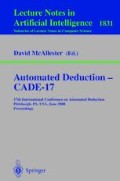Abstract
Fluted logic is a fragment of first-order logic without function symbols in which the arguments of atomic subformulae form ordered sequences. A consequence of this restriction is that, whereas first-order logic is only semi-decidable, fluted logic is decidable. In this paper we present a sound, complete and terminating inference procedure for fluted logic. Our characterisation of fluted logic is in terms of a new class of so-called fluted clauses. We show that this class is decidable by an ordering refinement of first-order resolution and a new form of dynamic renaming, called separation.
Access this chapter
Tax calculation will be finalised at checkout
Purchases are for personal use only
Preview
Unable to display preview. Download preview PDF.
References
Bachmair, L., Ganzinger, H.: Rewrite-based equational theorem proving with selection and simplification. J. Logic Computat. 4(3), 217–247 (1994)
Bachmair, L., Ganzinger, H.: Resolution theorem proving. In: Robinson, J.A., Voronkov, A. (eds.) Handbook of Automated Reasoning. Elsevier, Amsterdam (2000) (to appear)
Bachmair, L., Ganzinger, H., Waldmann, U.: Superposition with simplification as a decision procedure for the monadic class with equality. In: Mundici, D., Gottlob, G., Leitsch, A. (eds.) KGC 1993. LNCS, vol. 713, pp. 83–96. Springer, Heidelberg (1993)
de Nivelle, H.: A resolution decision procedure for the guarded fragment. In: Kirchner, C., Kirchner, H. (eds.) CADE 1998. LNCS (LNAI), vol. 1421, pp. 191–204. Springer, Heidelberg (1998)
Fermüller, C., Leitsch, A., Tammet, T., Zamov, N.: Resolution Methods for the Decision Problem. LNCS, vol. 679. Springer, Heidelberg (1993)
Fermüller, C.G., Leitsch, A., Hustadt, U., Tammet, T.: Resolution theorem proving. In: Robinson, J.A., Voronkov, A. (eds.) Handbook of Automated Reasoning. Elsevier, Amsterdam (2000) (to appear)
Ganzinger, H., de Nivelle, H.: A superposition decision procedure for the guarded fragment with equality. In: Fourteenth Annual IEEE Symposium on Logic in Computer Science, pp. 295–303. IEEE Computer Society Press, Los Alamitos (1999)
Gargov, G., Passy, S.: A note on Boolean modal logic. In: Petkov, P.P. (ed.) Mathematical Logic: Proceedings of the 1988 Heyting Summerschool, pp. 299–309. Plenum Press, New York (1990)
Goranko, V., Passy, S.: Using the universal modality: Gains and questions. J. Logic Computat. 2(1), 5–30 (1992)
Halpern, J.Y., Moses, Y.: A guide to completeness and complexity for modal logics of knowledge and belief. Artificial Intelligence 54, 319–379 (1992)
Herzig, A.: A new decidable fragment of first order logic. In: Abstracts of the Third Logical Biennial, Summer School & Conference in Honour of S. C. Kleene, Varna, Bulgaria (1990)
Humberstone, I.L.: Inaccessible worlds. Notre Dame J. Formal Logic 24(3), 346–352 (1983)
Humberstone, I.L.: The modal logic of ‘all and only’. Notre Dame J. Formal Logic 28(2), 177–188 (1987)
Hustadt, U., Schmidt, R.A.: An empirical analysis of modal theorem provers. J. Appl. Non-Classical Logics 9(4) (1999)
Hustadt, U., Schmidt, R.A.: Maslov’s class K revisited. In: Ganzinger, H. (ed.) CADE 1999. LNCS (LNAI), vol. 1632, pp. 172–186. Springer, Heidelberg (1999)
Hustadt, U., Schmidt, R.A.: Issues of decidability for description logics in the framework of resolution. In: Caferra, R., Salzer, G. (eds.) FTP 1998. LNCS (LNAI), vol. 1761, pp. 192–206. Springer, Heidelberg (2000)
Hustadt, U., Schmidt, R.A.: A resolution decision procedure for fluted logic. Technical Report UMCS-00-3-1, University of Manchester, UK (2000)
Joyner Jr., W.H.: Resolution strategies as decision procedures. J. ACM 23(3), 398–417 (1976)
Ohlbach, H.J., Schmidt, R.A.: Functional translation and second-order frame properties of modal logics. J. Logic Computat. 7(5), 581–603 (1997)
Plaisted, D.A., Greenbaum, S.: A structure-preserving clause form translation. J. Symbolic Computat. 2, 293–304 (1986)
Purdy, W.C.: Decidability of fluted logic with identity. Notre Dame J. Formal Logic 37(1), 84–104 (1996)
Purdy, W.C.: Fluted formulas and the limits of decidability. J. Symbolic Logic 61(2), 608–620 (1996)
Purdy, W.C.: Surrogate variables in natural language. In: Böttner, M. (ed.) Proc. of the Workshop on Variable-Free Semantics (1996) (to appear)
Purdy, W.C.: Quine’s ‘limits of decision’. J. Symbolic Logic 64, 1439–1466 (1999)
Quine, W.V.: Variables explained away. In: Proc. American Philosophy Society, vol. 104, pp. 343–347 (1960)
Schmidt, R.A.: Decidability by resolution for propositional modal logics. J. Automated Reasoning 22(4), 379–396 (1999)
Tseitin, G.S.: On the complexity of derivations in propositional calculus. In: Slisenko, A.O. (ed.) Studies in Constructive Mathematics and Mathematical Logic, Part II, pp. 115–125, Consultants Bureau, New York (1970)
Weidenbach, C.: SPASS (1999), http://spass.mpi-sb.mpg.de
Author information
Authors and Affiliations
Editor information
Editors and Affiliations
Rights and permissions
Copyright information
© 2000 Springer-Verlag Berlin Heidelberg
About this paper
Cite this paper
Schmidt, R.A., Hustadt, U. (2000). A Resolution Decision Procedure for Fluted Logic. In: McAllester, D. (eds) Automated Deduction - CADE-17. CADE 2000. Lecture Notes in Computer Science(), vol 1831. Springer, Berlin, Heidelberg. https://doi.org/10.1007/10721959_34
Download citation
DOI: https://doi.org/10.1007/10721959_34
Publisher Name: Springer, Berlin, Heidelberg
Print ISBN: 978-3-540-67664-5
Online ISBN: 978-3-540-45101-3
eBook Packages: Springer Book Archive

